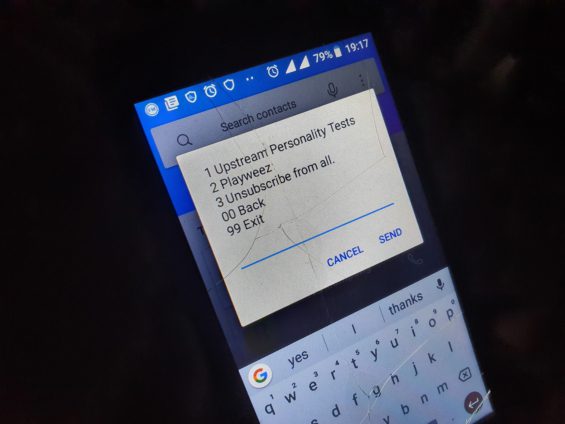"My credit finishes too early" has become a mantra among many mobile phone users in Ghana.
Have you been experiencing faster mobile credit depletion soon after recharging? Perhaps, it's about time you started checking the number of mobile service subscriptions on your phone.
A Luv News investigation has found that as high as 95 services are unknowingly being subscribed to by mobile phone users.
Victims were found to have subscriptions ranging from 1 to 8.
"I'll buy 5 cedis credit and after making just 2 calls, it tells me, you don't have enough credit," Afia, a cleaner is puzzled.
Afia is not in this situation alone. For Abena, it's a headache.
"How my credit finishes too fast it’s just a mystery," she revealed.
I therefore tried to find out about Afia's subscriptions. Interestingly, Afia has subscribed to 3 services. These are Infotainment Zone games, Faith Builder and Romance Tinder.

Afia who can hardly read has unknowingly subscribed to 4 services on her malfunctioning phone
Abena's phone also revealed three subscriptions: ilovemobi play, gospel message.
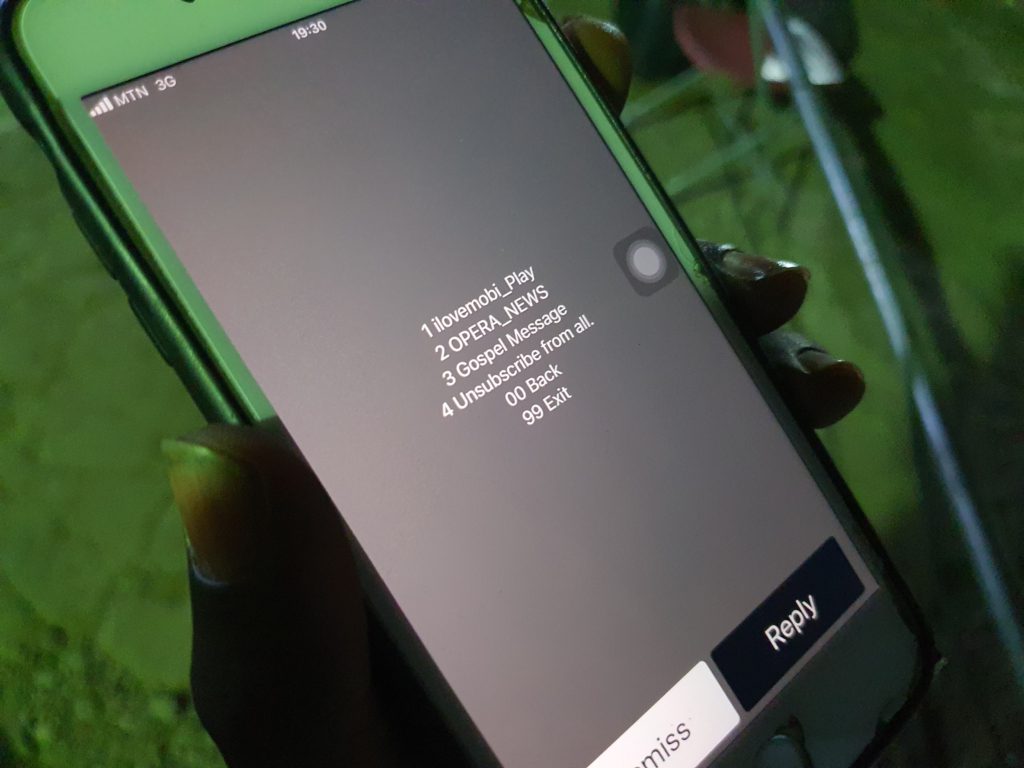
However, for Amos, of the 2 services he has subscribed to, Spin the Wheel and Goal, he intentionally did for the former. But for the latter, he had no idea.
"With the spin, the points determine the bundle. It generates a code which is used to redeem credit or bundle. It starts from 200 points. So the points are used to exchange credit,” Amos, a driver, explained clearly.
“As for Goal, I have no idea,” he clarified.

Forced subscription?
In order to have a fair idea of the types of subscriptions, we tried to find out more from disgruntled users of the three major telcos; MTN, Vodafone and AirtelTigo.
100 affected users were therefore selected for this exercise.
The survey found 95 unknowingly subscribed services.
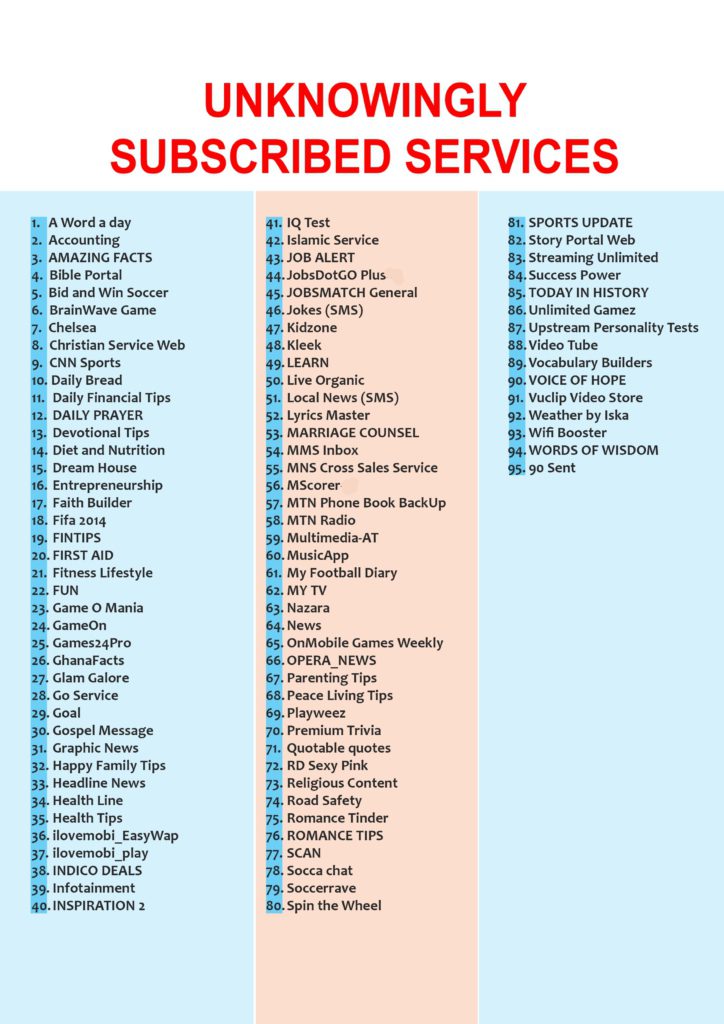
Out of these services, Games24Pro, JobsDotGO Plus, MScorer, RD Sexy Pink and MusicApp constituted the frequently occuring services, from 6 and above. RD Sexy Pink and JobsDotGo Plus were found among 12 users; Games24Pro and MusicApp on 12 and 13 users respectively. MScorer took the first place, being found with 20 users.

Shades of charges
Our survey found the subscription charges range from 0.19 Ghana Cedis to 0.85 Ghana Cedis.
One of the subscriptions which appeared in 35 percent of the affected users was MScorer. This service carries a hefty price tag of 0.75 Ghana Cedis. A search in the Vodafone InfoShop yielded no results. I then emailed the Customer Care Service to find more about this service. I got: "Kindly be informed the Mscorer is a form of entertainment content service; customers can listen and download music contents when subscribed to this service," the email read.
Just when I thought I was done, I chanced on another service known as Premium Trivia. Premium Trivia topped with 0.85 Ghana Cedis.
According to Vodafone Ghana’s website, Trivia is simply a game.
It says “To become a Standard Participant in the Trivia Game you need to send an SMS to the short code 560 or dial the USSD Code *560#. This will come at no cost to the subscriber. However, to become a Premium Participant in the Trivia Game, you need to send an SMS to the short Code 570 or dial the USSD Code *570# at a daily cost of GHS 0.85 (including all taxes).”
One of the affected is Vodafone user, Kingsley. He had both, in addition to 5 others.
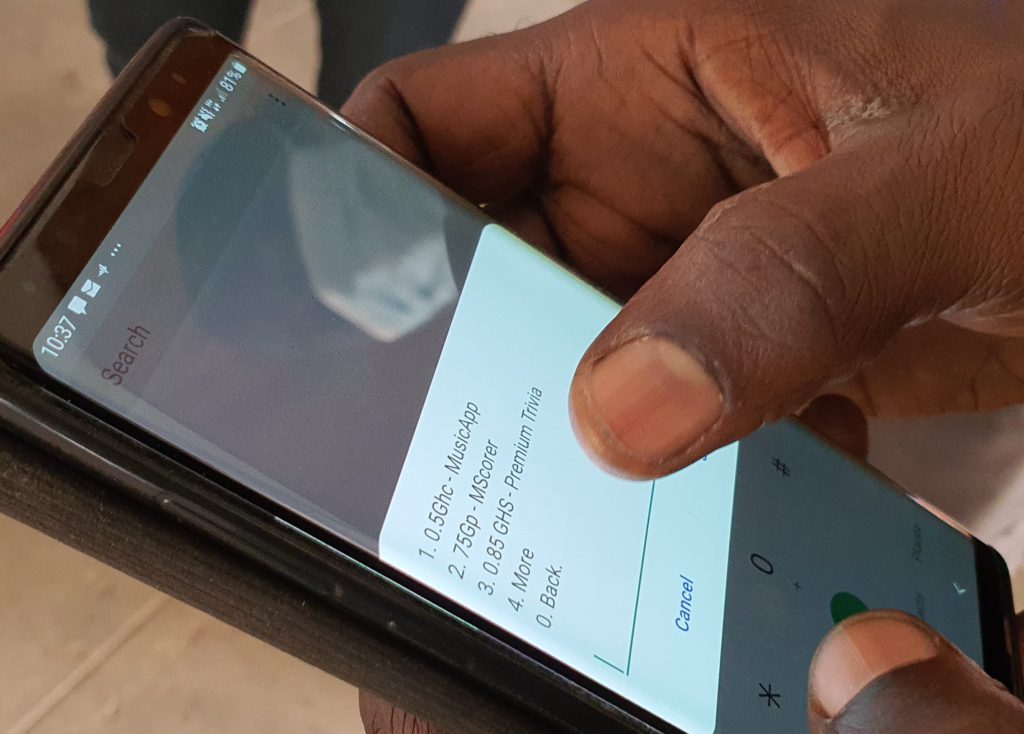
And, of course, he had no idea what they were.
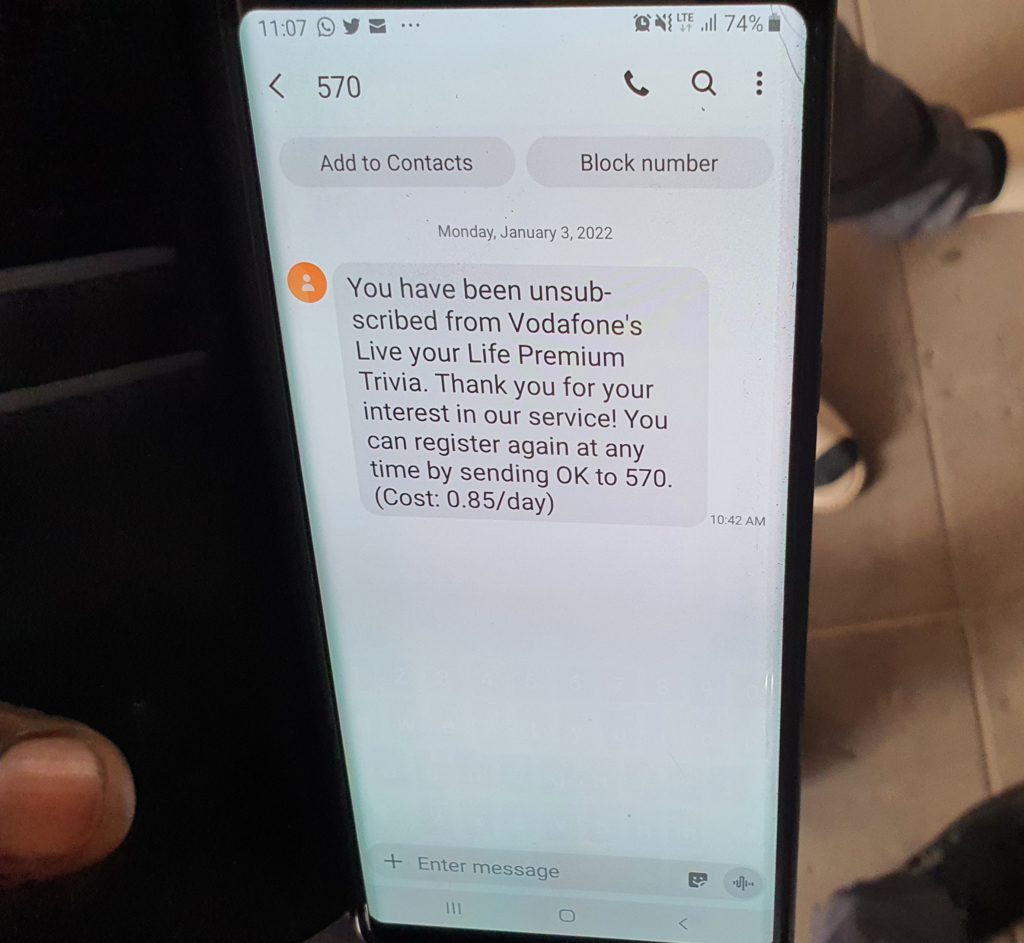
Are Telcos aware?
MTN has been sending messages to users to unsubscribe from any services they wished to.
But how do users get onto these services they have no idea about?
Do they subscribe unknowingly?
According to the CEO of the Chamber of Telecommunications, Dr. Kenneth Ashigbey, many of these unsolicited subscriptions are being perpetuated by National Communications Authority-licensed third parties.
“There are third parties who have been given licenses by the NCA and it’s true most of them do not go through the process,” he confirmed.
Edward only remembers signing unto a caller tune but he ended up with 5 subscriptions: game portal, RD sexy pink, Bible Portal, soccer chat and ilovemobi_EasyWap.
"It was a caller tune I subscribed to but I don't know how this came about," he said.
Dr. Kester Quist-Aphetsi of the Ghana Telecom University who has no idea of how he subscribed to one of his four subscriptions believes mobile users subscribe to these services unknowingly.
He said these requests to subscribe appear at the end of calls and some text messages.
“I’ve experienced those pop ups several times. Even for some of the messages I click on them without the time to read and know what it entails.
“For many, the messages will come and they’ll click OK and they might not be aware they’re going through the subscription steps,” he said.
Extortion and broken trust
Evelyn, a trader and an MTN user has been involved in a fracas with her teenage daughter for dwindling credit. She buys 10 cedis every week. Evelyn has therefore decided to stop using the network.
“I’ve been spending a lot on credit. It finishes up so easily.
“I’ve decided to stop using MTN,” she said.
I therefore checked her subscriptions and she’s on MTN radio and Daily prayer.
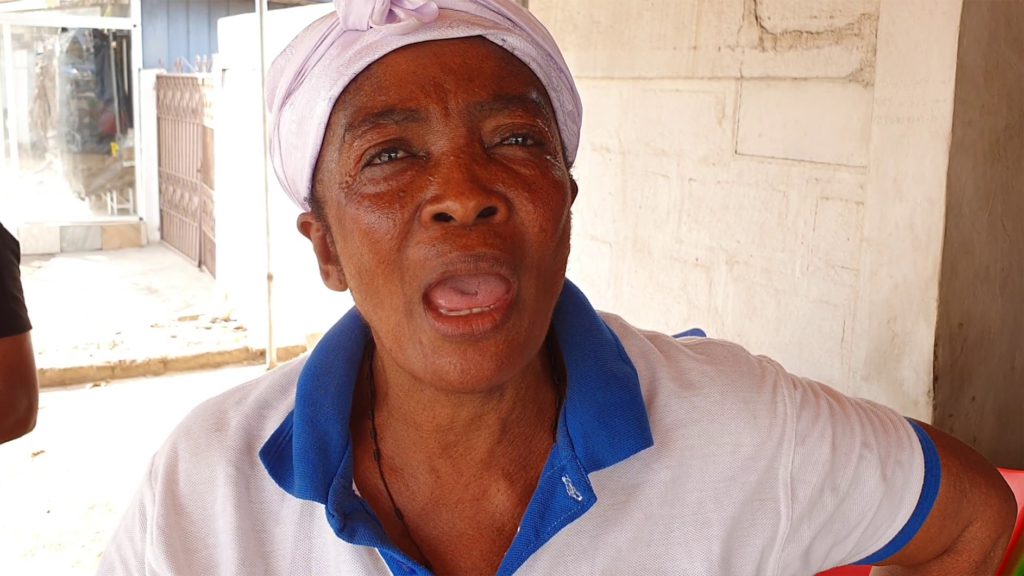
Joseph uses both MTN and Vodafone. He has however decided to abandon his Vodafone SIM card. He finds the 30 pesewas deduction at every credit upload unbearable.
“Every time I upload the credit, they take 30 pesewas. I’ve told them to stop sending me those messages but they wouldn’t, so I’ve stopped using the Chip,” he revealed.
A check on Joseph’s phone confirmed his claim. He has 2 subscriptions: INSPIRATION 2 and Bid and Win soccer.
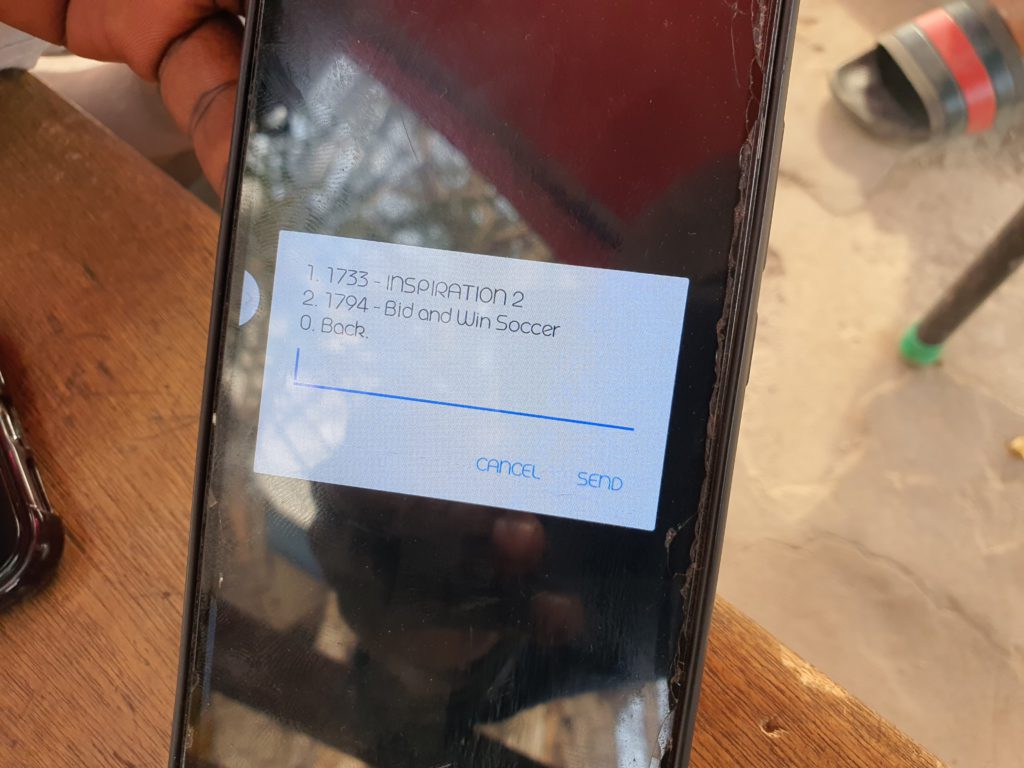
Dr. Quist-Aphetsi is quick to point out it’s an indirect form of extortion and tends to incommode mobile phone users.
“Indirectly they’re extorting money and this causes inconvenience,” he said.
He says this is a recipe for network abandonment and switch.
“The subscribers are going through a lot with mobile money and scammers.
“When this one adds to it, it creates a burden because they think the network is not secured and may switch to networks where they feel they’re secured,” he said.
What to do?
To check if there is any paid subscription on one's phone, the user is supposed to dial: *175# for MTN, *463# for Vodafone and for AirtelTigo, *100#.
The user would have to then follow the prompts and check and unsubscribe.
On MTN, except the number of subscriptions goes beyond 4, there appears a step where one can unsubscribe to all. For Vodafone however, each single subscription must be unsubscribed, same for Airtel Tigo.


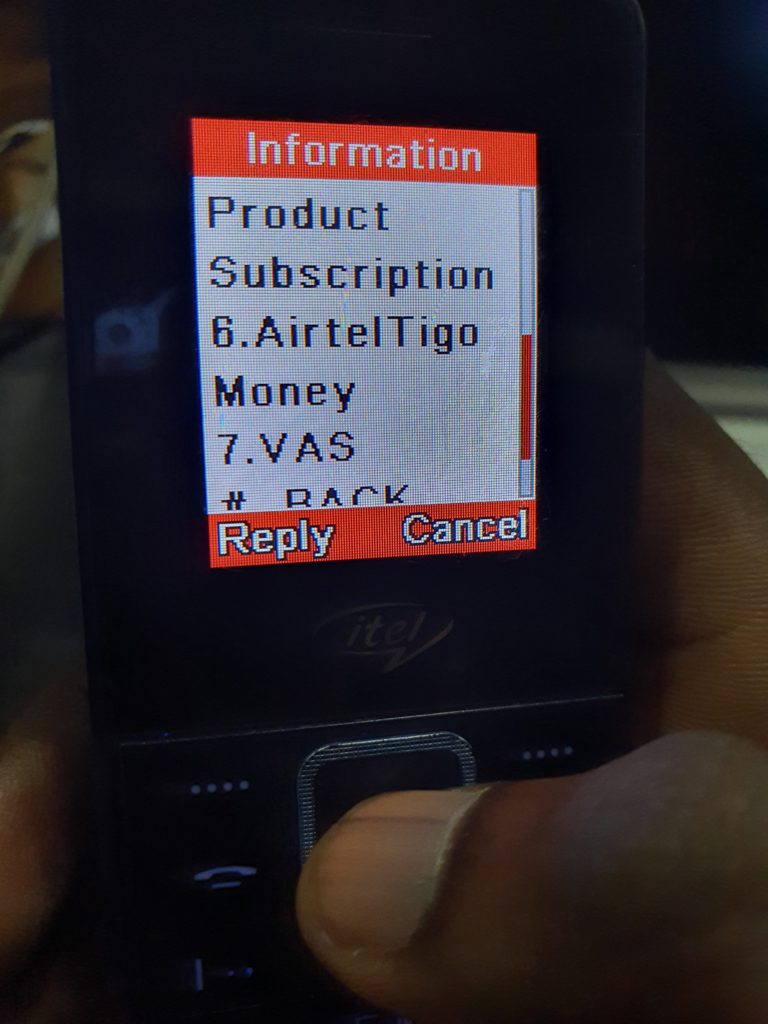
The survey found that aside the ignorance about this procedure, especially; the about 40 percent of the users we interviewed who have had little formal education, had difficulty going about this process.
“How would I have known this,” Asare quizzed.
I realized Joseph too was not successful with the messages to Vodafone to stop sending these messages because he has been doing it the wrong way.
Dr. Quist-Aphetsi believes “beyond making the unsubscription process easier, there should be notification to the people, on the services they have subscribed to, for instance, at the end of every month.”
He again advocates extensive advertisement of services and the use of short codes for the users to willingly subscribe.
“The best thing is to let the person enter the short codes themselves to subscribe by going through the process of accepting or not accepting it,” he said.
Recovering cash?
Kingsley, who is a 21-year Vodafone user is charged 0.85 Ghana Cedis daily on Premium Trivia.
For 365 days, he gives Vodafone Ghana 310. 25 Ghana Cedis.
For half of the duration he has used the network, that is, roughly a decade, Kingsley has spent 3,102.5 Ghana Cedis on an unknown service.
The Electronic Transactions Act, 2008 Act 772 states:
(1) Except in the case of a notice sent by an electronic communications provider to a customer in relation to the service, a person shall not send unsolicited electronic communications to a consumer without obtaining the prior consent of the consumer.
(2) A person who sends electronic commercial communication to a consumer shall provide the consumer (a) with the option to cancel the subscription to the mailing list of that person, and (b) with the identifying particulars of the source from which that person obtained the consumer’s personal information at the request of the consumer.
(3) An agreement shall not be deemed to have been concluded where a consumer fails to respond to an unsolicited communication; and the consumer is entitled to recover the costs associated with the cancellation of unsolicited communication.
(4) A person who contravenes subsection (1) commits an offence and is liable on summary conviction to a fine of not more than five thousand penalty units or a term of imprisonment of not more than ten years or to both. (5) A person who sends unsolicited commercial communications to another person or who continues to send unsolicited commercial communications after cancellation of the subscription commits an offence and is liable on summary conviction to a fine of not more than five thousand penalty units or a term of imprisonment of not more than ten years or to both.
It has become crucial for this law to be set in motion to recover all the monies lost through these unsolicited subscriptions.
Sanitizing subscriptions
At a knowledge forum organized by the Chamber of Telecommunications, unsolicited subscriptions also featured.
Dr. Kenneth Ashigbey says his outfit is trying to enforce the signing in of every subscription.
He hints that soon, his outfit will begin a campaign to educate mobile phone users on the subscription and the unsubscription processes.
“We’re trying to enforce, for every subscription that you do, you’re given the option to actually sign in.
“We want to educate the mobile users on those they’d inadvertently subscribed to these services so they can deal with them.
“In the coming days, we will run educational campaigns to educate consumers on these unsolicited subscriptions,” he added.
For especially the IT illiterates, Dr. Ashigbey wants the use of voice to unsubscribe.
“To be able deal with those who are not educated, there’s the need to use an IDR process to be able to use voice in order to find out about their subscriptions,” he said.
In the meantime, Dr. Quist-Aphetsi also advises mobile phone users against clicking on pop up messages.
He says mobile phone users can simply click on the power button.
“In most cases, it’s only an OK message that comes and when that happens they would have to choose to click on it and wait for some time for the message to go or click on the power button,” he said.
Luckily, those who might chance on this piece may have their way around this high level of extortion.
But for the IT illiterates who form a chunk of mobile users, the little cash used to purchase credit to talk to their loved ones are being used to provide services they have never asked for, and would never even need in their lifetime.
Latest Stories
-
Private citizen petitions Mahama to sack GIFEC CEO Rashid Tanko-Computer over alleged ‘fake’ PhD
30 minutes -
Quarry operators warn of nationwide shutdown over encroachment threats
50 minutes -
Ecobank Ghana approves GH₵0.34 dividend for 2024, records GH₵5.4bn revenue
56 minutes -
Ga East MCE engages Ga Chiefs to foster developmental unity
59 minutes -
Mahama pardons 62 radio stations sanctioned by NCA
1 hour -
Over 1.1 million children trapped in labour – CHRAJ warns
2 hours -
8 BECE candidates injured in fatal crash, denied exam after late arrival
2 hours -
GNFS saves majority of cargo in trailer fire on Accra-Kumasi highway
2 hours -
Telecel Ghana launches “Too Much Money” promo with GHS1.2m grand prize
2 hours -
Government, CIMG deepen collaboration to support brand Ghana Agenda
2 hours -
Government vows to recover unauthorised payments to Zoomlion
2 hours -
KNUST Mastercard Scholars hand over cluster of projects to Ayigya Basic School
2 hours -
Gabby Otchere-Darko confirms Asaase Radio shutdown amid NCA crackdown
2 hours -
Fair Wages Commission reacts to calls to re-negotiate nurses’ conditions of service
2 hours -
5.3% Q1 GDP growth a good sign – Mahama assures stability and prosperity for all
3 hours

